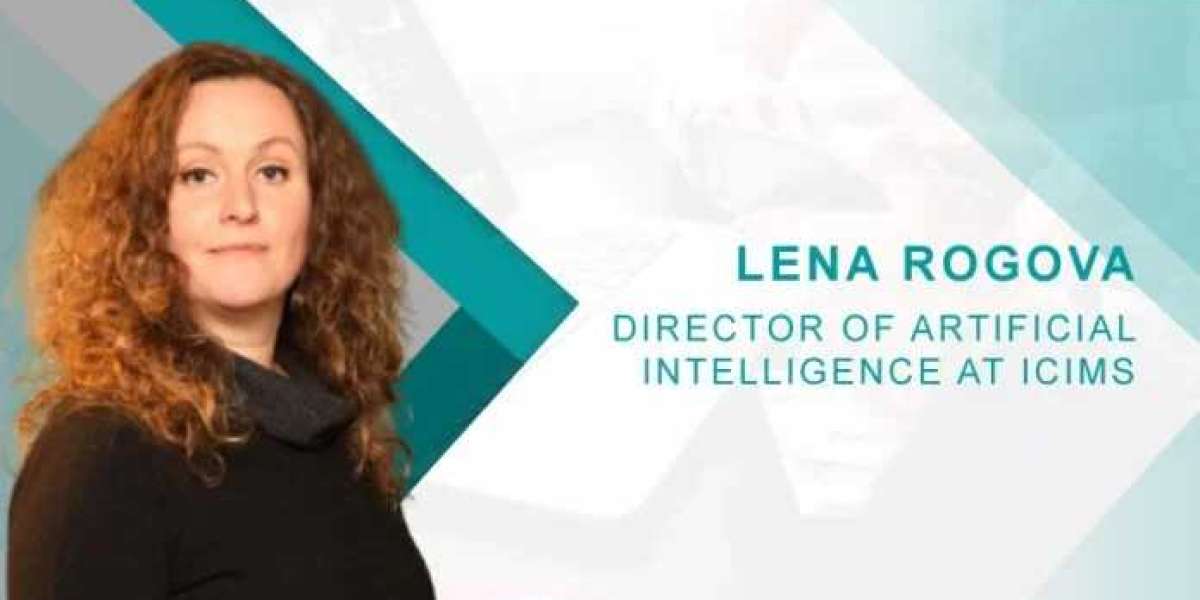Hello Lena, welcome to HRTech! To kick things off, could you share your path to becoming the Director of Artificial Intelligence at iCIMS, and how your background in HR technology influenced this journey?
Throughout my career, I’ve gained experience across various facets of the recruitment industry, including roles in marketing, business development and AI product management. My true passion has always been in technology–I’m a tech enthusiast at heart. Early in my career, I served in senior marketing roles at Hays PLC, a FTSE 250 recruitment and workforce solutions business, where I developed a deep understanding of the recruitment technology industry.
During this time, I was actively involved in the Dublin startup scene. I attended various Hackathons and startup events, and through these happenings, I was introduced to Opening.io, a data science startup creating AI recruitment solutions, known for its cutting-edge candidate search and match tool. I joined Opening.io in 2017 as a business development director, seeing the career move as the perfect opportunity to immerse myself further into the world of AI and HR technology.
In 2020, iCIMS acquired Opening.io to further its AI vision and enable customers to reap the benefits of industry-leading machine learning combined with iCIMS’ unrivaled data set. That is when I began working on the product side of AI/ML, helping iCIMS deliver on its mission of reshaping the future of recruitment with automation.
Today, I am proud to serve as portfolio director of AI/ML at iCIMS, where I lead the company’s AI team in leveraging the power of deep learning and natural language to create smarter talent acquisition solutions that help teams make better hiring decisions, improve efficiency, and keep responsibility, transparency, privacy and trust at the core.
AI has rapidly transformed the talent acquisition landscape. How do you see its role evolving in recruitment, and what key challenges has it helped to address in recent years?
AI has taken the world of HR by storm, helping to address several challenges in the talent acquisition process. Al can help reduce bias in hiring and improve the candidate and recruiter experiences. Using the right AI to improve decision making and content creation, for example, improves recruiter efficiency and can give them time back so they can focus on the more strategic elements of recruiting. In fact, iCIMS data revealed that 90% of CHROs see the recruiter role morphing into one of strategic advising, with 47% saying the shift has already happened.
As AI advances, it will deliver even greater value, helping recruiters to make smarter, data-driven hiring decisions. One key development area is the shift towards agentic AI. The technology will increasingly move beyond just answering questions and actively guide candidates and recruiters through the talent acquisition journey. For example, AI-powered chatbots will help streamline scheduling and communication between both parties, making the recruitment journey more efficient and engaging.
Organizations will also continue to prioritize AI explainability to ensure transparency and build trust in the technology. Efforts will focus on ensuring algorithms aren’t seen as “black boxes,” but rather as tools that can be clearly interpreted and trusted by humans. This will be especially critical as AI legislation and global regulations take shape, requiring companies to evolve with evolving legal and ethical standards.
Lastly, embedded intelligence is poised to improve significantly as the technology becomes more integrated into everyday recruitment processes, such as candidate sourcing and screening. As AI systems gain greater access to data and become more embedded in recruiting workflows, their predictions and recommendations will continuously improve. This advancement will ultimately lead to improved efficiency, better talent decision-making and stronger organizational performance.
While these advancements are exciting, it’s important to recognize that they will bring new challenges, particularly in maintaining accountability and ensuring that AI-driven decisions align with company values, talent expectations and broader market and regulatory shifts. Companies have a responsibility to strike a balance between innovation and risk, and ensure outcomes continue to benefit both organizations and candidates alike.
iCIMS Copilot has made strides in enhancing recruitment processes. Could you walk us through how this tool optimizes the efficiency of talent acquisition teams?
iCIMS’ GenAI-powered recruiting assistant Copilot gives talent acquisition teams a competitive hiring advantage and unparalleled productivity across the talent lifecycle. iCIMS Copilot can help recruiters create interview questions for open requisitions based on the job requisition and user input. It can also create and/or optimize job descriptions to help recruitment teams attract the right candidates.
With Copilot, iCIMS will be elevating all aspects of the talent experience. Our AI approach is rooted in practicality, utility and responsibility. For us, it’s not just about doing this faster with AI. It’s about creating capacity for the human side of the equation and helping transform how organizations build and grow their teams with greater efficiency, accuracy and at lower costs.
With AI being a highly regulated area, what steps does iCIMS take to ensure compliance with global AI governance standards and regulations?
After the Opening.io acquisition in 2020, iCIMS took steps to formalize our AI governance practices and build a Responsible AI program. At the time, there were very few AI-specific standards, frameworks and regulations. However, it was reported the European Union was developing a comprehensive AI regulation–now known as the EU AI Act–that closely aligned to the “Ethics Guidelines for Trustworthy AI” developed by the High-Level Expert Group on AI (HLEG), an independent expert group set up by the European Commission. We modeled our AI governance practices around AIHLEG guidelines and continue to adapt and improve our governance practices to ensure our AI journey remains ethical, trustworthy and people-first.
We also developed comprehensive internal AI policies to guide our teams. Our iCIMS AI/ML Code of Ethics provides standards for our AI program, among other governance policies that are regularly updated to align with new and evolving standards.
We also established various committees to ensure our development and use of AI align with our AI/ML Code of Ethics, including our Responsible AI Committee, AI Governance Committee and Generative AI Committee – all of which are formed by personnel from across the business to ensure we consider multiple interests and viewpoints.
AI systems, as we know, are only as good as the data we feed them. That’s why we have rigorous processes in place to ensure that our AI is built and trained on reliable datasets. Our algorithms are regularly evaluated for fairness. And we’ve built explainability into the iCIMS platform. Users can see how AI arrived at a particular prediction or insight. This transparency fosters trust and ensures users are always in control.
Personalization in candidate interactions has become more prevalent with AI. How has this technology improved candidate engagement?
Personalization in candidate interactions is significantly more prevalent with the advent of AI, particularly through the use of advanced chatbots. Today’s AI-powered chatbots are becoming highly customizable, offering a more tailored and engaging experience for candidates. To me, this evolution represents one of the biggest advancements since AI talent matching.
Long and tedious online application processes are a shared experience for most job seekers, but AI is helping to change that. Tools like intelligent chatbots make the application process more streamlined and user-friendly. These chatbots aren’t just answering questions–they actively help candidates move through the hiring journey in a way that feels more personalized and less burdensome. And this is only the beginning. I see a future where chatbots–acting as the digital assistants of the application journey–speak multiple languages and have the answer to any candidate question.
Another example is iCIMS Candidate Experience Management (CXM). iCIMS CXM helps TA teams to find candidates that are both most interested and most qualified through a combination of advanced marketing automation, engagement scoring and artificial intelligence – a first of its kind for candidate relationship management (CRM) technology. The new solution builds upon iCIMS’ long standing AI innovation program and empowers organizations to find and nurture talent that converts to quality hires. Recruiters can use iCIMS CXM to create hyper-personalized candidate journeys and improve engagement. They can craft personalized outreach that resonates with each candidate based on their unique interactions with content, boosting engagement and conversions.
iCIMS integrated artificial intelligence into its recruiting platform following the acquisition of Opening.io in 2020. How have acquisitions like Opening.io shaped iCIMS’ AI capabilities and strategic direction?
iCIMS’ acquisition of Opening.io came at a very key time for the industry. Opening.io was an innovator in candidate search and matching, and at the time of the acquisition, the use case for that was almost clearly there – allowing applicants to quickly find jobs that match their skills and allowing recruiters to reconsider past applications via talent rediscovery.
What Opening.io brought to iCIMS was the technical expertise and architecture to take candidate search and matching to the next level. Today, matching still plays a huge role in our strategy, as it continues to be a critical component in helping our customers identify and engage the best talent for their business.
Striking the right balance with AI is crucial. In your view, how can organizations fully leverage AI’s benefits while managing potential risks related to bias and transparency?
Choosing the right vendor is essential to harnessing the full benefits of AI while managing risks related to bias, transparency, data security and compliance. Selecting the right vendor starts with organizations understanding their specific needs for AI and clearly defining what AI success looks like for their business. To make the right choice, it’s essential for AI stakeholders across the business to align on key questions like, “What challenges or inefficiencies are we trying to solve with AI?” and “What potential risks do we need to mitigate when implementing AI?” Once leaders understand the primary reasons for using AI, then they can identify a vendor partner that aligns with their organizational goals, understands their industry and can scale with them as their use of AI evolves.
Regardless of where organizations are in their AI journey, it’s also essential to view AI as a tool to amplify human efforts rather than replacing them. Decision-making should never be driven solely by AI. This is especially true in recruitment and talent acquisition, where AI’s impact is significant. While AI can help streamline processes like candidate matching and screening, all decisions should always have a human in the loop to ensure fairness, accuracy and context. By combining AI’s capabilities with human judgement, organizations can ensure their operations are not only faster and smarter but responsible, fair and equitable.
Collaboration is key in advancing AI best practices. How can industry leaders and organizations work together to establish standards and guidelines for responsible AI use?
Collaboration across the business is essential when it comes to implementing and managing AI systems effectively. Data scientists aren’t the only decision makers. AI touches many facets of an organization, making it critical that all stakeholders–from legal and privacy to HR and marketing teams–have a voice at the table. This ensures the technology is developed with a holistic perspective and usage aligns with broader organizational goals. More importantly, diverse perspectives and oversight helps ensure AI solutions are responsible and ethical in design and remain people-first.
On a personal note, what initially drew you to a career in AI, and what inspired you to lead AI initiatives at iCIMS?
iCIMS has a clear vision to transform the talent acquisition landscape with AI-powered technology solutions. As someone who has always been a techie at heart, I am excited to be a part of such an innovative team that is at the forefront of developing solutions that streamline hiring processes and improve the experience for candidates, employees and recruiters alike.
Lastly, for organizations looking to bring AI into their talent acquisition processes, what advice would you give to ensure a smooth and impactful integration?
My first piece of advice is to be realistic. There is no universal AI solution, so it’s important for leaders to assess what will work best for their organization. Organizations that are accustomed to adopting new technology might choose to adopt a decentralized AI model, while others who are less familiar with technology adoption or are more risk-averse might prefer to establish a centralized AI team to ensure more oversight across the business. The key is to tailor the AI approach to the company, not the other way around.
Secondly, create an AI team that is responsible for developing, implementing and maintaining AI solutions. This may involve onboarding external talent who have worked with AI in similar industries or for a company of similar size. Alternatively, organizations can source talent internally by identifying employees with strong technical skills and a knack for driving innovation. Whether external or internal, assembling the right team is critical to ensure that AI initiatives are aligned with business goals and effectively address specific challenges within the talent acquisition process.








